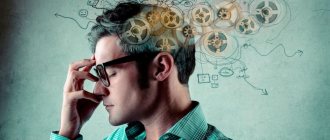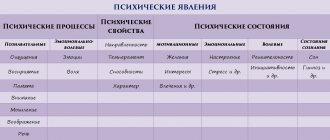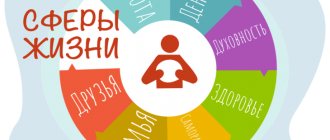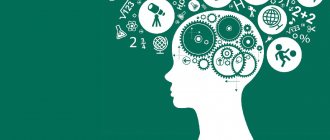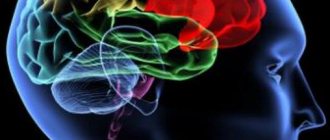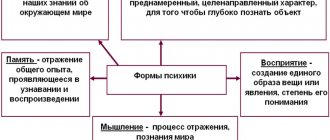Currently, there is an intensive penetration of the systems approach into the theory and methodology of psychology. It seems to us that one of the productive directions for its implementation is associated with the use of the concept of “functional system”. It was introduced by P.K. Anokhin, was fruitfully used in the study of fundamental patterns of behavior and formed the basis of neuropsychological research conducted under the leadership of A.R. Luria; N.A. Bernstein also used a concept close to this concept when considering the scheme of constructing movements. The consistent application of this approach may be of fundamental importance for psychology, but work in this direction is just beginning.
This report makes an attempt to approach the definition of the concepts of “ability” and “giftedness” from the perspective of a functional system. It seems to us productive to use the concept of “mental function” for this purpose. This approach can become the basis for identifying individual abilities and their classification, without violating the principle of the activity approach to the analysis of the formation and development of abilities. To show this, let us turn to the concept of “mental function”. It is usually said that the psyche implements cognitive and regulatory functions, which are differentiated and implemented in the functions of reflection, processing and storage of information, programming, regulation and control of activity. The noted functions are included in any activity; at the same time, they themselves can act as an activity when a person is faced with the task of discovering, remembering, imagining, doing something, etc.
Any specific activity can be analyzed and differentiated into individual mental functions. We can say that mental functions implement the most general, generic forms of activity. At the same time, they are “molecular” units of activity and act as the starting point for its analysis. In relation to specific activities, mental functions are characterized by multifunctionality, i.e. they can be included in various activities.
Based on the above, we can make a preliminary conclusion that it is advisable to correlate abilities with the corresponding mental functions. Since mental functions are realized in mental processes, abilities must be correlated with the properties of cognitive and psychomotor processes, and their classification must be based on the classification of mental functions and processes. Another thing is giftedness, which is an individually unique combination of abilities. It must be correlated with a specific activity, and its classification must be based on a psychological analysis of the relevant types of activity.
The basic nature of mental functions is reflected in the structure of the brain. Neuropsychological data convincingly show that each mental function is implemented by a specialized functional system and they are all combined into a single functional system of the brain. A fairly complete description of the neurophysiological side of mental activity is given by A.R. Luria, which frees us from the need for a detailed presentation of this material.
Usually, abilities are understood as individual psychological characteristics that distinguish one person from another and are manifested in the success of an activity. Let's try to clarify this definition. Let's turn to the term “features”. It can only be understood in relation to the categories “individual” and “universal”. As is known, the individual, the particular and the universal are philosophical categories that express the objective connections of the world and characterize the process of its cognition. “Single (separate, individual) - a specific object, limited in space and time; universal (general) - a similar property, abstracted from individual and special phenomena, a sign on the basis of which objects and phenomena are combined into one or another class, type or genus (the so-called abstract-universal); unity in diversity is a law that connects diverse phenomena into a system (the so-called concrete-universal); the particular is the unity of the individual and the universal, an object that in its concrete integrity is as a certain universal and as an individual not excluded from the interconnection of the world. The individual is the form of existence of the universal in reality; the particular is the universal, realized in the individual.”
Based on the foregoing, in order to define abilities as features, we must determine that individual and universal, the features of which are abilities. Universal (common) for each ability will be a property realized by a specific mental function, distinguishing one mental function from another. This is the property for which a given mental function was formed in the process of human evolutionary development, for example, the property of adequately reflecting the influences of the objective world (perception) or the property of imprinting these influences (memory), etc. Each specific property is realized by a specific functional system. The property is manifested (discovered) in the process of human interaction with the outside world.
We can now define abilities from the position of the universal as properties of functional systems that implement cognitive and psychomotor processes. However, for a complete definition it is necessary to consider them from the standpoint of a single (separate, individual). In other words, we must consider how this or that property is expressed in a particular individual. The singular will be represented by a measure of the severity of the property; the measure will reflect the dialectical unity of the qualitative and quantitative manifestation of the property. Consequently, abilities can be defined as properties of functional systems that implement cognitive and psychomotor processes that have an individual measure of severity, manifested in the success and qualitative originality of the performance of activities. When determining an individual measure of the severity of abilities, it is advisable to adhere to the same parameters as when characterizing the effectiveness of any activity: productivity, quality and reliability (in terms of the mental function in question).
Giftedness in the approach under consideration will act as a systemic quality of jointly working functional systems that implement various mental functions that are included in the functional system of activity and have an individual measure of expression, manifested in the success and qualitative originality of the performance of the activity.
The considered system of concepts agrees well with the Marxist definition of the psyche as a property of matter organized in a special way - the brain:
- psyche - property of the brain;
- abilities - properties of individual functional systems;
— makings — properties of elements of functional systems.
The productivity of the proposed approach to determining abilities is confirmed by the fact that it becomes possible to explain many factors and connect them into an overall picture.
In Russian psychology, based on the Marxist thesis about the primacy of material, practical activity over ideal, back in the 20s of our century, a productive point of view was formulated, according to which a person began to be considered as a subject of mental activity. This point of view was reflected in the works of K.A. Abulkhanova, B.G. Ananyev, L. S. Vygotsky, A. N. Leontiev, SL. Rubinstein. Based on this methodological position, extensive experimental studies were carried out to study the role of practical activity in the development of mental functions (A.V. Zaporozhets, B.G. Ananyev, L.A. Venger). Particular attention was paid to the role of perceptual actions in adequately reflecting the objective world (B.G. Ananyev et al., V.P. Zinchepko, B.F. Lomov, A.V. Yarbus, A.V. Zaporozhets et al., V.P. Zinchenko and N. Yu. Vergiles, A. V. Filippov). As a result, measuring, commensurate, corrective, construction, control, and tonic regulatory functions of perceptual actions were identified.
A significant contribution to the analysis of memory as a process was made by the works of A.N. Leontyeva, A.A. Smirnova, V.Ya. Lyaudis, P.I. Zinchenko, who revealed the structure of memory and the composition of basic mnemonic actions.
A characteristic feature of the works of this period on the study of cognitive processes is their analytical nature. The authors sought to prove either the very fact of the subject’s activity in the processes of cognition, or the conditionality of development by practical activity, or the complex composition of the cognitive process, or to identify the role of active actions (perceptual, mnemonic) in mental processes. There is no doubt that such an analytical approach was not only possible and useful, but also necessary at a certain stage of cognition.
Further implementation of the principle of activity led to the need to study the dependence of the effectiveness of cognitive processes on the motives, goals and tasks that motivate and direct the activity of the subject of activity. However, these studies were based mainly on the scheme of studying the dependence of productivity on motivation, goals, and tasks. The qualitative specificity of cognitive processes, their structure and the peculiarities of cognitive actions have not been sufficiently studied.
Finally, it should be noted that the emphasis on the role of objective activity in the development of mental functions has relegated to the background the consideration of the biological mechanisms of cognitive processes in works of a psychological nature.
One of the first successful attempts to comprehensively consider the mechanisms of mental functions was the work of B. G. Ananyev. According to the scheme he proposed, mental function is “a complex combination of very different formations - functional, operational and motivational” (p. 188). Considering their interaction using the example of perception, B.G. Ananyev wrote: “The genotypic conditioning of a person’s ontogenetic properties, which consistently develop over time during development, forms the basis of the functional mechanisms of perceptual processes. However, this basis actually exists only in interaction with the accumulation of individual experience through the formation, differentiation and generalization of conditioned connections, in which the training of functions is carried out. This aspect of perceptual processes consists of complex systems of perceptual actions, which can be called operating mechanisms of perceptual processes” (p. 190). An important point in the analysis of the mechanisms of perception is motivation, which determines the direction, selectivity and intensity of perceptual acts. Motivation has a tonic and regulating effect on both functional and operational mechanisms. “This influence has not yet been sufficiently studied,” notes B. G. Ananyev. — but it is already known that their effects are different in relation to both types of mechanisms” (p. 192-193).
The analysis of experimental data carried out by B. G. Ananyev allowed him to conclude that it is legitimate to extend the formulated position about the formidable composition of the mental process to the area of memory, intellectual and emotional-volitional processes.
The concept of the mechanism of mental functions proposed by B. G. Ananyev makes a successful attempt to solve the problem of correlating the biological and social foundations of mental activity. Functional mechanisms “are determined by ontogenetic evolution and the natural organization of the human individual... Operating mechanisms are not contained in the brain itself, the substrate of consciousness, they are acquired by the individual in the process of upbringing, education, in his general socialization and are of a specific historical nature.” Functional mechanisms relate to the characteristics of a person as an individual, operational mechanisms - to the characteristics of a person as a subject of activity, motivational - to the characteristics of a person as an individual and personality.
Let us now briefly dwell on the issue of the development of mental functions. In the studies of B. G. Ananyev, B. M. Teplov, L. I. Seletskaya and others, it was shown that the implementation of practical activities that require taking into account certain properties of objects leads to an increase in the subject’s distinctive sensitivity to these properties. How does a subtle, differentiated reflection of the properties of objects occur, corresponding to the tasks of practical activity? Considering the mechanism of sensory reflection, A. N. Leontyev formulated at one time the “assimilation” hypothesis, according to which “the mechanism for reproducing a specific quality of influence should also include such processes that are capable of expressing the nature of the influencing property” (p. 182). Such a mechanism of perception in the sense of touch is “the mechanism of assimilation of the dynamics of processes in the receptive system to the properties of external influence” (p. 174). When forming pitch hearing, this is a comparative analysis, which consists in adjusting the movements of the vocal apparatus to the acting sound stimulus. A thought close to the “assimilation” hypothesis is contained in the definition of information formulated by N. Wiener. Information, he writes, is the designation of content received from the external world in the process of our adaptation to it and the adaptation of our senses to it. This definition, as well as the assimilation hypothesis, indicates the need to adapt human senses in order to obtain information for organizing behavior and activity. A. N. Leontiev's hypothesis suggests that the mechanism of sensory reflection consists in assimilating the effector components of perception to the properties of the object. It can be assumed that the assimilation hypothesis affects one of the aspects of the mechanisms that ensure adequate perception, at least in relation to successive perception. However, the assimilation hypothesis does not consider perceptual actions themselves, their specificity, or qualitative originality when reflecting a particular object. The physiological mechanisms of perception are also left aside, while there is quite a wide range of experimental material showing that the reflection of objective reality is associated with the work of innate mechanisms of reception.
These issues are considered in the concept of B. G. Ananyev. According to the scheme he proposed, the development of mental functions manifests itself as the development of functional and operational mechanisms. “Functional mechanisms in their initial, very early emergence (in the first weeks of postnatal life) implement a phylogenetic program and take shape long before the emergence of operational mechanisms, constituting their internal foundation on which, in the process of learning, education and accumulation of behavioral experience, an increasingly complex system is built.” operational mechanisms” (p. 191). For each mental function, its own operating mechanisms are formed. There are complex interactions between functional and operational mechanisms. The development of operational mechanisms requires a certain level of functional development. The development of operational mechanisms brings functional mechanisms into a “new phase of development, since their capabilities are progressively increasing, and the level of their systematicity is increasing” (p. 191).
An important point in the development of operational mechanisms is the subtle adaptation to the conditions of a specific activity, taking into account the accumulation of labor experience and skill of the subject. Let's call this process the process of restructuring operational mechanisms into operational ones.
Comparing the approaches of A.N. Leontyev and B.G. Ananyev to the development of mental functions, we can conclude that they complement each other. At the same time, the presented material allows us to conclude that the implementation of mental functions is a specific activity, directed by a specific motive, having its own purpose and operational composition. This activity can be adequately described only by a psychological system of activity, and the development of a mental function can be represented as the formation of a system that realizes this function as a process of systemogenesis. The architecture of this system must, in fundamental respects, coincide with the architecture of the functional system of labor activity. A specific feature of the system under consideration will be that, as shown above, to a certain extent it has a natural property that allows it to realize a certain mental function. This property manifests itself through functional mechanisms. These will be the primary means that allow you to achieve the goal. In professional activities, such means are the knowledge, abilities, skills and abilities of the subject.
In conclusion, let us dwell on the problem of awareness of mental functions in activity. We see a promising approach to this problem from the perspective of the relationship between action (activity) and skill. This problem was studied most deeply in the works of S. L. Rubinstein. He examines the problem of skill in the specific and broad sense of the word. The specific aspect of a skill appears as the problem of excluding “from the field of consciousness the individual components of a conscious action through which it is performed” (p. 553). “The question of skills in the broad sense of the word is a question of the relationship between consciousness and automaticity in human behavior - their polarity, interconnection and mutual transitions into each other. This problem and this relationship apply to all human activities” (p. 555).
Considering the problem of skill in a specific sense, Rubinstein speaks of the automation of components of conscious action. However, he reveals the concept of a component in a dynamic aspect. Such a component can be any action, the execution of which is automated as a result of exercises. “At the same time, skills, being in their external results actions or more or less complex systems of action, in their psychological structure are not so much actions, i.e., acts aimed at their result as the goal of his activity realized by the subject, but rather operations or methods , through which action is carried out aimed at a conscious goal. If at first they were actions, becoming skills as a result of automation, they, giving objectively the same effect, cease to be actions by their psychological nature - if by actions we mean acts aimed at a conscious goal (p. 553). The author also makes an important point that not all actions can be automated, but only those whose goal is to master a method of action. “A skill thus arises as a consciously “automated action and then functions as an automated way of performing the action” (p.554).
Based on the above, one can understand why mental function is realized in professional activity in most cases automatically. This is achieved due to the fact that it functions as an automated way of performing a professional action. Consequently, if functional mechanisms act as the primary means on the basis of which mental functions are realized, then the mental functions themselves act as means of achieving the goal of activity. At the same time, in activity they will develop under the influence of the contradiction between the requirements of the activity and the abilities and capabilities to implement these requirements.
The presented approach to the concepts of “ability” and “giftedness” allows us to assimilate different approaches to the problem of ability, while they act as complementary to each other. From the perspective of the proposed approach, a number of controversial issues are resolved. In particular, in a number of psychological works there is a long discussion about whether mental processes can be considered forms of activity or not. In light of the facts stated above, the following answer can be given: mental processes that implement individual mental functions can be considered as types of mental activity, but those that have been automated and turned into methods (means) of activity. Under certain conditions, they can acquire an independent goal and turn into full-fledged actions.
From the perspective of the proposed approach, opportunities arise for formulating tasks for physiological research of the problem. In particular, we can pose the following questions: what properties of neurons and functional physiological systems allow them to implement very specific mental functions (reflection, imprinting, conservation, etc.) and to what extent are these properties determined by the elements of the system and what is its structure?
Finally, the proposed concept of abilities allows us to better understand the definition of the psyche as a property of the brain.
All of the above is, in our opinion, a serious basis in favor of the proposed understanding of the content of the concepts of “ability” and “giftedness”.
Psychological Journal, Vol. 4, No. 5, 1983, p. 38-46.
What are abilities
We often use the word “ability” without delving into its essence. For example, the expressions “capable person” or “capable child” are not entirely correct. You cannot be capable in general; ability is always associated with a specific type of activity, in which it manifests itself and develops.
In psychology, ability is understood as a set of human qualities that provide him with the opportunity to engage in a certain activity and achieve success in it. That is, if we say that this child is capable, then we need to clarify why. You might be good at math, art, long-distance running, or surgery. There are, however, general abilities needed in different types of activities, but we will talk about them a little later.
It is safe to say that there are no incapable people, especially children. Without aptitude for mathematics, a person can achieve success in management or design, cooking or sports. And problems with spelling at school are not a reason to call a student incapable. Maybe he has the gift of a great artist?
